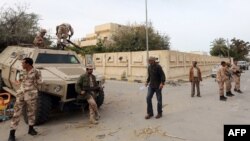Libyan militia fighters blamed for the worst unrest in Tripoli since the fall of Moammar Gadhafi began pulling out of the capital Monday as Libyan army units moved in to secure the streets.
Militias from the coastal city of Misrata began to withdraw to the east after opening fire on protesters Friday, triggering two days of clashes that killed at least 46 people and wounded hundreds more.
Also Monday, Libya's deputy intelligence chief Mustafa Nuh was freed by his abductors, a day after they seized him as he was leaving Tripoli airport.
It is unclear who kidnapped Nuh, whose family is originally from Misrata.
Last week's clashes between rival militias highlighted Libya's struggle to curb former fighters and hardline Islamists who refuse to disarm two years after helping oust Mr. Gadhafi in an uprising backed by NATO bombs.
Public anger had been directed at Misrata militias who had developed a strong presence in Tripoli.
The frustration also prompted a three-day general strike in Tripoli. On Monday, the second day of the strike, the city was quiet and only essential services such as bakeries, gas stations and hospitals were working.
The Defense Ministry announced it would deploy troops to secure Tripoli and appealed to residents to support and help them.
But Libya's armed forces are still no match for the rival militias who control other parts of the capital and the country.
The Libyan National Congress, or interim parliament, has moved to dissolve a pro-government militia known as the Revolutionary Operations Bureau, which was responsible for the brief kidnapping of Libyan Prime Minister Ali Zeidan last month.
Western powers, including the United States and its NATO allies, are offering more training and aid for Libya's military. The country's North African neighbors are increasingly worried about spillover from its militia chaos.
Militias from the coastal city of Misrata began to withdraw to the east after opening fire on protesters Friday, triggering two days of clashes that killed at least 46 people and wounded hundreds more.
Also Monday, Libya's deputy intelligence chief Mustafa Nuh was freed by his abductors, a day after they seized him as he was leaving Tripoli airport.
It is unclear who kidnapped Nuh, whose family is originally from Misrata.
Last week's clashes between rival militias highlighted Libya's struggle to curb former fighters and hardline Islamists who refuse to disarm two years after helping oust Mr. Gadhafi in an uprising backed by NATO bombs.
Public anger had been directed at Misrata militias who had developed a strong presence in Tripoli.
The frustration also prompted a three-day general strike in Tripoli. On Monday, the second day of the strike, the city was quiet and only essential services such as bakeries, gas stations and hospitals were working.
The Defense Ministry announced it would deploy troops to secure Tripoli and appealed to residents to support and help them.
But Libya's armed forces are still no match for the rival militias who control other parts of the capital and the country.
The Libyan National Congress, or interim parliament, has moved to dissolve a pro-government militia known as the Revolutionary Operations Bureau, which was responsible for the brief kidnapping of Libyan Prime Minister Ali Zeidan last month.
Western powers, including the United States and its NATO allies, are offering more training and aid for Libya's military. The country's North African neighbors are increasingly worried about spillover from its militia chaos.





